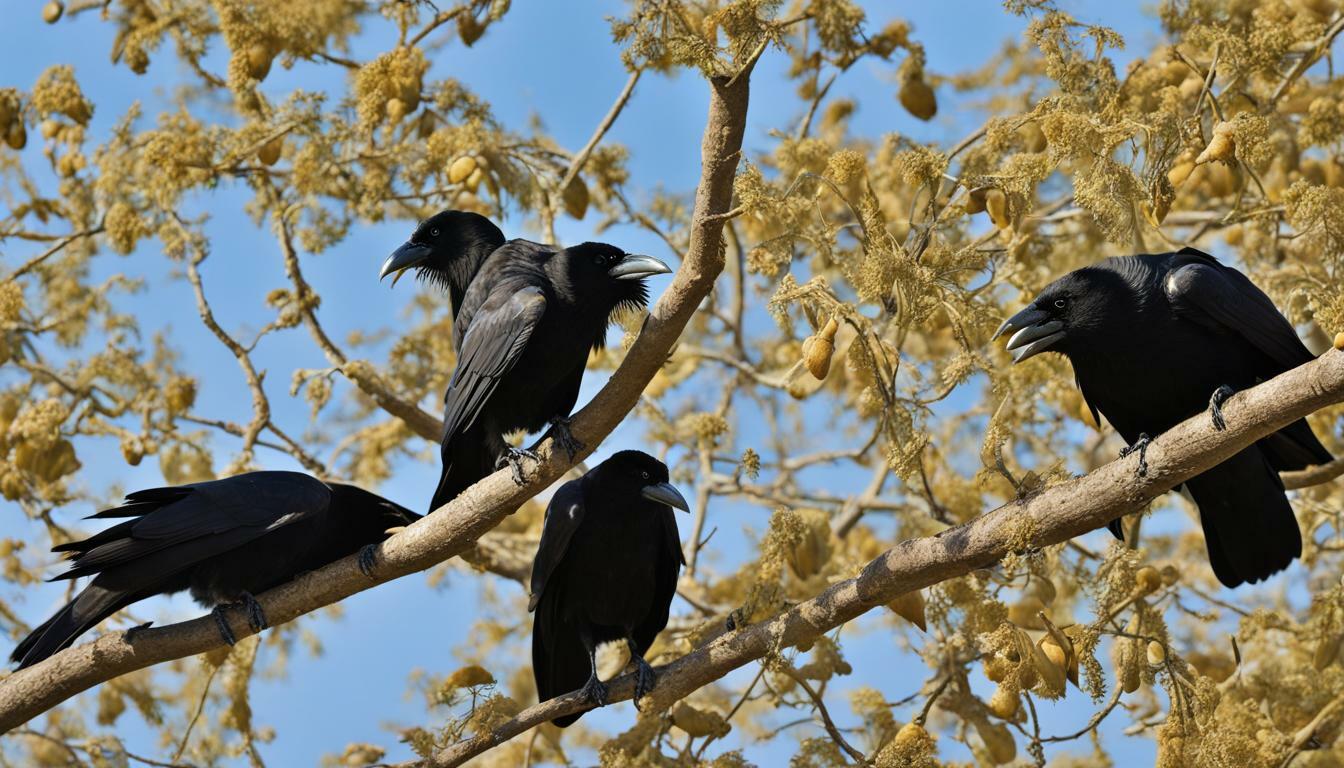Have you ever seen a group of crows gathered around roadkill or a discarded piece of food? If so, you may have assumed that crows are scavengers. But is this really true? In this article, we’ll explore the scavenging behavior of crows and uncover the truth about these intelligent birds.
Key Takeaways:
- Crows are commonly perceived as scavengers, but this may not always be the case.
- Crows have a preference for carrion, but they are also opportunistic and can adapt to various food sources.
- Crows exhibit problem-solving abilities and can recognize and remember food sources.
- Different crow species may exhibit varying scavenging preferences and behaviors.
The Diet of Crows: Exploring their Scavenging Habits
As scavenger birds like crows are commonly thought of as opportunistic feeders that eat carrion, but their diet is actually quite diverse and adaptable. Crows will eat whatever is available, including insects, small animals, fruits, and nuts. However, carrion makes up a significant portion of their diet, and they have developed specialized adaptations to take advantage of this food source.
When crows come across carrion, they will first assess whether it is safe to eat. This includes checking for signs of decay or disease. If the carrion is deemed safe, the crow will use its strong beak to tear off pieces of flesh. Their digestive system is also adapted to handle this often-rotting food, with a shorter intestine and a higher acid content in their stomachs.
But crows are not just passive scavengers; they are also active hunters. They will prey on smaller animals, such as rodents, and will even raid the nests of other birds to steal eggs or chicks. In urban areas, they have also been known to scavenge from trash cans and dumpsters, further demonstrating their adaptability.
One interesting behavior of crows is their ability to remember where they found food sources. They can recall specific locations where carrion or other food was available, and will often return to these spots when they are hungry. This is a testament to their problem-solving abilities and intelligence as scavengers in the animal kingdom.
Adaptations and Survival Tactics of Scavenging Crows
Crows are opportunistic scavengers, meaning they are able to adapt to various food sources based on availability. Their scavenging habits have allowed them to survive in urban environments, where human activity has created an abundance of food sources.
Studies have shown that crows have an impressive memory and are able to recognize and remember food sources, both old and new. This enables them to quickly locate food when it is available and increase their chances of survival during times of scarcity.
Crows are also known for their problem-solving abilities. They have been observed using tools to obtain food, such as using twigs to extract insects from tree bark or using cars to crack open nuts. This intelligence and adaptability allow crows to thrive in a variety of environments.
Despite being scavengers, crows have specific feeding habits. They prefer fresh carrion over decaying flesh, and will often bury their food to store for later consumption. This behavior not only helps to preserve the food source but also reduces the likelihood of competition from other scavengers.
Crows are also highly social animals and will often work together to locate and obtain food. This behavior can be observed in groups of crows known as “murders.” By working together, crows are able to increase their success rate in finding food and reduce the risk of predation.
In summary, crows’ scavenging habits are a testament to their intelligence and adaptability. Their ability to recognize and remember food sources, use tools to obtain food, and work together to secure food sources have allowed them to thrive in various environments. As opportunistic scavengers, crows play an important role in the ecosystem and are vital to the maintenance of a healthy environment.
Scavenging in Crow Species: Diversity and Behavior
Crows are a diverse group of birds found throughout the world, with over 40 different species known to exist. While all crows share some scavenging tendencies, the specifics of their diet and scavenging behavior can vary widely among species.
One example of species diversity can be seen in the American crow, which is known to scavenge on a variety of food sources, including carrion, insects, and fruits. In contrast, the Hawaiian crow, also known as the ‘Alala, is an endangered species that has developed a specialized scavenging habit of feeding on the meat and organs of dead birds, also known as ‘necrophagy’.
Other species of crows may also exhibit unique scavenging behaviors. The Australian raven, for example, has been observed to scavenge on the eggs of other bird species, while the Indian jungle crow is known to feed on the flesh of dead animals and garbage in urban areas.
Despite their varied scavenging behaviors, all crow species share a unique ability to adapt to their environment and food sources. This adaptability has enabled many crow species to thrive in human-dominated areas, where they can take advantage of food waste and other resources.
Intelligence and Scavenging Behavior
Crows are also known for their exceptional intelligence, problem-solving skills, and memory. These traits enable them to become skilled scavengers, as they are able to recognize and remember food sources, navigate complex environments, and even use tools to obtain food.
One study conducted by the University of Cambridge found that New Caledonian crows were able to use sticks to extract insects from tree bark, demonstrating an impressive level of problem-solving intelligence.
Overall, the scavenging behavior of crows is an important facet of their survival and adaptability. Their diverse habits and unique abilities have helped them to thrive in a variety of environments, earning them a reputation as some of the most intelligent scavengers in the animal kingdom.
Do All Birds Have Warm Blood or is it Specific to Certain Species?
Birds’ body temperature is a fascinating topic of study. While most birds are warm-blooded, there are certain species, like the hummingbird, that can cool their body temperature during torpor periods. This allows them to conserve energy overnight. However, the majority of birds maintain a stable warm body temperature that enables them to thrive in various environments, from icy mountains to scorching deserts.
Is It True That All Birds Are Cold Blooded?
Birds are warm-blooded creatures, meaning they can regulate their body temperature regardless of the external conditions. So, the statement are birds cold blooded is not true. Birds have high metabolic rates and maintain a constant internal body temperature, allowing them to thrive in various environments.
Conclusion: Crows – Intelligent Scavengers of the Animal Kingdom
After exploring the scavenging behavior of crows, it is clear that they are opportunistic feeders that adapt to various food sources. Their preference for carrion, coupled with their ability to recognize and remember food sources, makes them important ecological players in the animal kingdom.
Throughout the article, we learned about the diverse scavenging behavior exhibited by different crow species. Despite these differences, crows are universally recognized for their intelligence and adaptability as scavengers.
Why is it important to understand the scavenging in crow species?
Understanding the scavenging behavior of crows allows us to appreciate their ecological role in the animal kingdom and the importance of conserving their populations. Additionally, this knowledge can help inform conservation strategies for other scavenger birds like vultures and condors.
In conclusion, crows are not just scavengers- they are intelligent and adaptable scavengers that play a significant role in the ecosystem. As we continue to study and appreciate these remarkable birds, we can better understand the complexity of the animal kingdom and our place within it.











